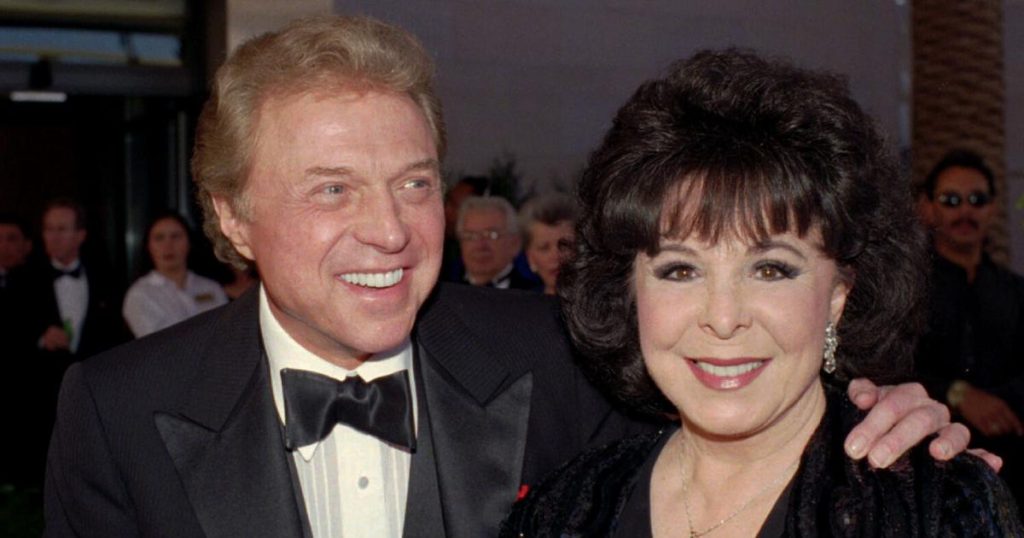NEW YORK – Steve Lawrence, a singer and top stage act who as a solo performer and in tandem with his wife, Eydie Gorme, kept Tin Pan Alley alive during the rock era, died Thursday. He was 88.
Lawrence, whose hits included “Go Away Little Girl,” died from complications due to Alzheimer’s disease, said Susan DuBow, a spokesperson for the family.
Lawrence and Gorme – or Steve & Eydie – were known for their frequent appearances on talk shows, in night clubs and on the stages of Las Vegas. The duo took inspiration from George Gershwin, Cole Porter, Jerome Kern and other songwriters.
Soon after Elvis Presley and other rock music pioneers began to dominate radio and records, Lawrence and his wife were approached about changing their style.
“We had a chance to get in on the ground floor of rock ’n’ roll,” he recalled in a 1989 interview. “It was 1957 and everything was changing, but I wanted to be Sinatra, not Rick Nelson.
“Our audience knows we’re not going to load up on heavy metal or set fire to the drummer – although on some nights we’ve talked about it,” he joked.
Although Lawrence and Gorme were best known as a team, both also had huge solo hits just months apart in the early 1960s.
In a statement, longtime friend Dionne Warwick said Lawrence was “resting with comfort in the arms of the Heavenly Father. My heartfelt condolences go out.”
Lawrence scored first in 1962 with the achingly romantic ballad “Go Away Little Girl,” written by the Brill Building songwriting team of Gerry Goffin and Carole King. Gorme matched his success the following year with “Blame It on the Bossa Nova,” a bouncy tune about a dance craze of the time that was written by Brill hitmakers Barry Mann and Cynthia Weil.
By the 1970s, Lawrence and his wife were a top draw in Las Vegas casinos and nightclubs across the country. They also were regularly on TV, making specials and guesting on various shows.
In the 1980s, when Vegas cut down on headline acts and nightclubs became scarcer, the pair drew large audiences in auditoriums.
“People come with a general idea of what they’re going to get with us,” Lawrence said in 1989. “It’s like a product. They buy a certain cereal and they know what to expect from that package.”
After several guest appearances on Steve Allen’s TV show, Lawrence was hired as a regular. When the program became NBC’s “Tonight” in 1954, he went with it, singing and exchanging quips with Allen. The series set the pattern for the long-running “The Tonight Show.”
“I think Steve Allen was the biggest thing that happened to me,” said Lawrence, who stayed with the show’s host for five years.
Early in the series’ run, a young singer named Eydie Gorme joined the cast. After singing together for four years, Lawrence and Gorme were married in 1957. Until Gorme’s death in 2013, they remained popular, whether working together in concert or making separate TV appearances.
He also made stage appearances without Gorme, including a starring role in a 1962 summer stock version of “Pal Joey.” He made it to Broadway in 1964 – and earned a Tony Award nomination – in the musical “What Makes Sammy Run?” based on Budd Schulberg’s classic novel about a New York hustler who claws his way to the top of the entertainment world.
Critics praised Lawrence but gave the play bad reviews. Still, it turned a profit, and insiders attributed its success to his performance.
Lawrence also had a few character roles in movies, most notably “Stand Up and Be Counted,” “Blues Brothers 2000,” “The Lonely Guy” and “The Yards.”
Native-born New Yorkers, Lawrence and Gorme lived in a Manhattan apartment during their early years together. When the center of TV entertainment shifted to Hollywood, they moved to Beverly Hills.
Born Sidney Liebowitz in New York City’s borough of Brooklyn, Lawrence was the son of a Jewish cantor who worked as a house painter. He began singing in his father’s synagogue choir at 8, moving on to bars and clubs by his mid-teens. He took his name from the first names of two nephews.
He and Gorme had two sons, David, a composer, and Michael. Long troubled with heart problems, Michael died of heart failure in 1986 at age 23.
“My dad was an inspiration to so many people,” his son David said in a statement. “But, to me, he was just this charming, handsome, hysterically funny guy who sang a lot. Sometimes alone and sometimes with his insanely talented wife. I am so lucky to have had him as a father and so proud to be his son.”
